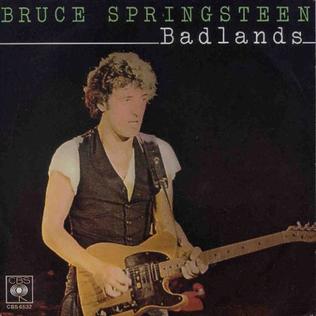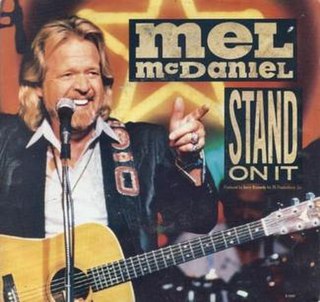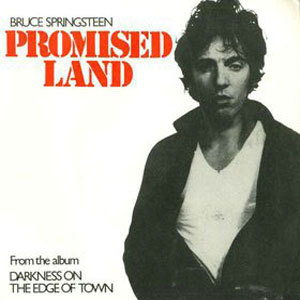
"Tenth Avenue Freeze-Out" is a song by the American singer-songwriter Bruce Springsteen, from his 1975 album Born to Run.
"Meeting Across the River" is the seventh track on Bruce Springsteen's breakthrough 1975 album, Born to Run; it also appeared as the B-side of "Born to Run", the lead single from that album. The song is often paired with "Jungleland" in concert, though without the Randy Brecker trumpet part from the record and with regular bass guitarist Garry Tallent.
"Growin' Up" is a song by American musician Bruce Springsteen from his 1973 album Greetings from Asbury Park, N.J..
"Highway Patrolman" is a song written and recorded by Bruce Springsteen and was first released as the fifth track on his 1982 album Nebraska.

"Badlands" is a song by the American singer-songwriter Bruce Springsteen, released as the second single from his fourth studio album Darkness on the Edge of Town in July 1978.
"Downbound Train" is a song that appears on the 1984 Bruce Springsteen album Born in the U.S.A. The song is a lament to a lost spouse, and takes on a melancholy tone. Author Christopher Sandford described the song as beginning "like a Keith Richards' riff" that ultimately moves to "one of those great country busted-heart lines, 'Now I work down at the car wash/where all it ever does is rain.'"
"Working on the Highway" is a 1984 song written and performed by Bruce Springsteen. It was released on the album Born in the U.S.A. and has remained a popular concert song for Springsteen and the E Street Band.
"Darlington County" is a 1984 song written and performed by Bruce Springsteen. It was released on the album Born in the U.S.A. and has remained a popular concert song for Springsteen and the E Street Band.
"Ramrod" is a song written and performed by Bruce Springsteen for his fifth album, The River, released in 1980. It was recorded at The Power Station in New York on June 12, 1979. The song was written and originally recorded on September 12, 1977, for Springsteen's Darkness on the Edge of Town album, but that recording was not used for its release on The River.

"Fade Away" is a 1980 song written and performed by Bruce Springsteen, accompanied by the E Street Band. It is included on his album The River, and the second single released from it in the United States, reaching the top twenty in both the United States and Canada.
"Be True" is a song by Bruce Springsteen. It was recorded on July 18, 1979 at The Power Station in New York in one of the early recording sessions for Bruce Springsteen's album The River. It was not released on the album, but in 1981 it was released as the B-side to the single release of "Fade Away", a song taken from The River album. According to Springsteen, "Be True" was left off The River album in favor of the song "Crush on You", a decision he has a hard time understanding in retrospect. Springsteen was already second guessing his decision to exclude "Be True" from The River before the album was even released.
"Independence Day" is a song written and performed by Bruce Springsteen. It was originally released on his fifth album, The River, in 1980. It was recorded at The Power Station in New York, on April 24–25, 1980.
"Wreck on the Highway" is a song written and performed by Bruce Springsteen. It was originally released as the final track on his fifth album, The River. The version released on The River was recorded at The Power Station in New York in March–April 1980. As well as being the last track on The River, it was the last song recorded for the album.
"Out in the Street" is a song written and performed by Bruce Springsteen from the 1980 album The River. It was recorded at The Power Station in New York between March and May 1980, as one of the last songs recorded for the album. Originally, Springsteen was going to keep the song off the album because it was so idealistic.
"Mary Queen of Arkansas" is a song by Bruce Springsteen from the album Greetings from Asbury Park, N.J., released in 1973. Springsteen played "Mary Queen of Arkansas" at his audition for John H. Hammond at CBS Records, who signed him to his first record contract on May 2, 1972, although Hammond was less impressed with this song than with "It's Hard to Be a Saint in the City" or with "Growin' Up". The day after signing the contract, Springsteen recorded "Mary Queen of Arkansas" as part of a 12-song demo for Hammond. The demo version of the song was released on Tracks in 1998.
"Adam Raised a Cain" is the second track from Bruce Springsteen's fourth album Darkness on the Edge of Town.

"Stand on It" is a song written and originally recorded by Bruce Springsteen. Springsteen initially released it as the non-LP B-side of the "Glory Days" single in May 1985; the track was also featured in the film Ruthless People and its accompanying soundtrack album. "Stand On It" later appeared in a slightly longer version with an extra verse on Springsteen's outtakes and B-sides compilation Tracks.

"The Promised Land" is a song by the American singer-songwriter Bruce Springsteen from his 1978 album Darkness on the Edge of Town. It was released as a single in Europe, backed by another song from Darkness on the Edge of Town, "Streets of Fire", the third single from the album after "Badlands" and "Prove It All Night". "The Promised Land" was also included on the compilation album The Essential Bruce Springsteen. The song has been a staple of Springsteen's live shows since 1978, and has been included on several concert albums and videos. The live album Live/1975–85 includes a 1985 performance of "The Promised Land" from a concert in Los Angeles, California. A performance of the song from a 2003 concert in Barcelona is included on the Live in Barcelona video. A June 28, 2009 live performance in London from the Working on a Dream Tour was included on the London Calling: Live in Hyde Park DVD. The box set The Promise contains video of three live performances of "The Promised Land", a 2009 performance from the Paramount Theater in Asbury Park, New Jersey, without an audience, a 1978 performance from a concert in Phoenix, Arizona, and another 1978 performance from a concert in Houston, Texas. Darren Hanlon covered "The Promised Land" on Play Some Pool, Skip Some School, Act Real Cool. Eddie Vedder has also covered this song live.

"Cadillac Ranch" is a song written by Bruce Springsteen that was first released on Springsteen's 1980 album The River. In 1981 it was released as a single in Europe, backed by "Be True" in France and by "Wreck on the Highway" in the UK. Although it was not released as a single in the US, it did reach #48 on the Billboard Mainstream Rock Tracks chart. A favorite in concert, a live version was included on Live/1975–85. A version was also included on the documentary film Blood Brothers.
"Darkness on the Edge of Town" is the last song on the 1978 album of the same name, Darkness on the Edge of Town, by Bruce Springsteen. It was the last song recorded and mixed, and in April 1978 it was designated the title song to a thematic album whose songs portray the struggles of the less-fortunate, not only to survive, but to keep their spirit and will to live alive, the title track portrays a hard-luck loser in life who refuses to give up. Springsteen's fourth album, released three years after his 1975 effort Born to Run, was delayed two years because of legal problems with his former manager, Mike Appel. Expectations were high after he took one year to complete the album.





